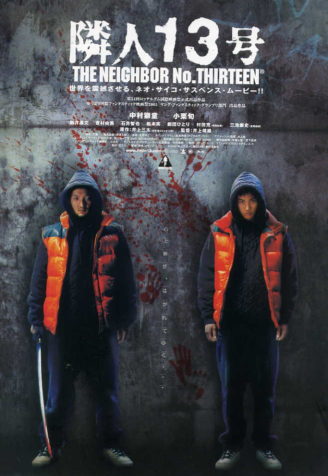 A film that offers a wicked twist on the age-old theme of a wimp taking revenge on his tormentors, this is a harsh, violent piece of work with an assured and compelling visual style. It is quite simply one of the strongest Japanese genre efforts to hit these shores in some time.
A film that offers a wicked twist on the age-old theme of a wimp taking revenge on his tormentors, this is a harsh, violent piece of work with an assured and compelling visual style. It is quite simply one of the strongest Japanese genre efforts to hit these shores in some time.
THE NEIGHBOR NO. THIRTEEN (RINJIN 13-go) was adapted from a manga by Santa Inoue about a tormented nerd who as an adult develops a split personality whose darker half embarks on a killing rampage. Inoue’s long-running comic was apparently all the rage in Japan during the nineties, and several film adaptations were contemplated. It wasn’t until 2004, however, that a movie version finally went forward under the tutelage of first-time director Yasuo Inque, a longtime commercial and music video whiz. Notable cast members included Yumi Yoshimura, of the popular Japanese musical series PUFFY, and director Takashi Miike, whose distinct brand of over-the-top moviemaking was an obvious template.
Juzo is a skinny nerd who always wears a geeky orange vest. As a kid he’s tortured by his classmates in every imaginable manner, with the sadistic Akai orchestrating the abuse. As a grown-up Juzo is still a nerd, with an orange vest identical to the one he wore as a kid. The adult Akai is still in Juzo’s life, and in more ways than one: not only has Akai, together with his fetching wife and young son, just moved into the apartment complex where Juzo lives, but he’s also the supervisor of a construction site where Juzo has started work. Akai’s abusive side once again rears its ugly head as in his supervisory role he bullies Juzo unmercifully. But now it seems Juzo has a new friend, No. Thirteen, a big, scary dude with a scarred face and discolored left eye who’s actually Juzo’s alter ego. No. Thirteen lives in a hallucinatory house located somewhere in Juzo’s subconscious, and begins to make periodic appearances in the real world to right the wrongs done to Juzo.
The problem is that No. Thirteen doesn’t just practice his unique brand of revenge on Juzo’s enemies; one of his first victims is a close friend and workmate of Juzo, who ends up beaten to death. Another victim is an annoying neighbor who makes the mistake of yelling at No. Thirteen…and pays for it big time. As you might expect, No. Thirteen next sets his sights on Akai and his family. Juzo, knowing full well what his alter ego is capable of, tries to intervene, but only succeeds in makes things worse. He’s put in charge of looking after Akai’s kid for a day while Akai and his wife are at the movies. Juzo takes the kid to an amusement park where No. Thirteen appears and tries to drown the tyke in a restroom sink. Another guy, a tough gangster, tries to intervene, but is no match for No. Thirteen. Thirteen then kidnaps the boy, who proves an ideal bargaining point in his final showdown with Akai. That showdown takes place in Juzo’s old school, where both Juzo and Akai confront the increasingly unhinged No. Thirteen.
This film marked Yasuo Inoue’s feature debut, but it doesn’t feel like a first-time effort. It’s a confident piece of work with a really distinct sense of style, marked by measured pacing that constantly undermines the traditional action-horror movie rhythms we’ve come to expect. It’s also a surprisingly mature film in the way it deals with childhood bullying and its consequences in a far from glib manner—Inoue’s approach is thoughtful and respectful to a fault, especially when one considers the less-than-refined nature of the original manga (which is filled with gratuitous violence and glimpses up ladies’ skirts).
From the start Inoue creates a sweaty, grungy air of impending brutality that hangs over the film like shroud. The onscreen nastiness isn’t all that prevalent (only four people die!), but violence is always in the air, conjured by gritty cinematography and an ever-present sense of coiled tension.
Inoue deserves credit for his work with the actors, all of whom turn in first-rate performances. This includes Yumi Yoshimura, best known for the above-mentioned PUFFY and, by her own admission, not an actress. The lead performers Shido Makamura and Shun Oguri are also quite impressive, playing different facets of the same character; as in FIGHT CLUB, Inoue imparts his schizophrenic protagonist by casting two distinct actors, a technique that works extremely well in a bold and unpredictable film that likewise works extremely well.
Vital Statistics
NEIGHBOR NO. THIRTEEN (RINJIN 13-go)
Media Suits/Amuse Soft Entertainment
Director: Yasuo Inque
Producers: Yoshinori Chiba, Hajime Kohama
Screenplay: Jaime Kado
(Based on the manga by Santa Inoue)
Cinematography: Taro Kawadu
Editing: Urahama Taro, Shojiro Urahama
Cast: Shido Nakamura, Shun Oguri, Hirofumi Arai, Yumi Yoshimura, Tomoya Ishii, Minoru Mastsumoto, Gekidanhitori, Mitsuru Murata, Takashi Miike
